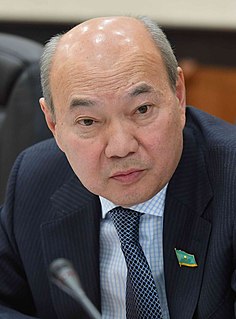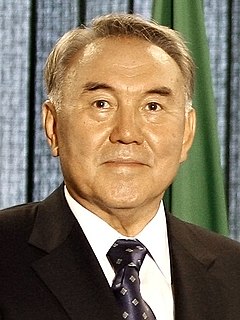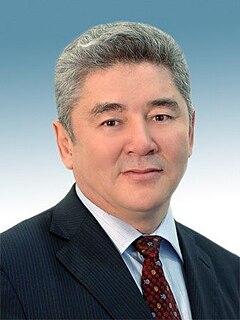
Nursultan Abishuly Nazarbayev is a Soviet and Kazakh politician who served as the first President of Kazakhstan, in office from country’s independence in 1991 until his formal resignation in 2019, and as the Chairman of the Security Council of Kazakhstan from 1991 to 2022. He held the special title as Elbasy from 2010 to 2022. Nazarbayev was one of the longest-ruling non-royal leaders in the world, having led Kazakhstan for nearly three decades, excluding chairmanship in the Security Council after the end of his presidency. He was named First Secretary of the Communist Party of the Kazakh SSR in 1989 and was elected as the nation's first president shortly before its independence from the Soviet Union.

The Parliament of the Republic of Kazakhstan is the bicameral legislature of Kazakhstan. The lower house is the Mazhilis, with 107 seats, which are elected to five-year terms. The upper house is the Senate, which has 47 members.

Dariga Nursultanqyzy Nazarbayeva is a Kazakh businesswoman and politician who is the daughter of the first President of Kazakhstan Nursultan Nazarbayev. She served as a member of the lower house Mazhilis from 10 January 2021 until 25 February 2022, and previously from 15 January 2012 to 11 September 2015, 19 September 2004 to 20 June 2007 respectively. She was Deputy Chairwoman of Mazhilis from 2014 to 2015 until being appointed as a Deputy Prime Minister under Massimov's cabinet. In 2016, Nazarbayeva became a member Senate of Kazakhstan in 2016. She served as the Senate Chairwoman from 2019 to 2020. Nazarbayeva is the eldest daughter of Nursultan Nazarbayev who was the President of Kazakhstan from 1990 to 2019.

The Auyl People's Patriotic Democratic Party or simply as Auyl, is a political party in Kazakhstan. It was originally founded by Gani Qaliev on 30 January 2000 as the Auyl Peasant Social Democratic Party before eventually merging with the Party of Patriots of Kazakhstan on 5 September 2015. The party is currently led by Senator for Turkistan Region Äli Bektaev from August 2015. With a membership of around 300,000 people, the Auyl since 2004 has participated in every Kazakhstan's parliamentary elections although never managing to enter the Mazhilis and has once nominated presidential candidate Toleutai Raqymbekov in 2019 presidential elections.

The Civic Party of Kazakhstan is a defunct political party in Kazakhstan that was led by First Secretary Azat Peruashev. The QAP was formed in 1998 and existed until 2006 when it was merged with Otan.

The Majilis is the lower house of the bicameral Parliament of Kazakhstan, known as the Parlamenti, in the Government of Kazakhstan. The upper house of Parliament is the Senate of Kazakhstan. There are 107 seats (98+9). Members of Parliament are elected to five-year terms.

Presidential elections were held in Kazakhstan on 4 December 2005. Incumbent President Nursultan Nazarbayev, in power since 1989, sought and won a 3rd term against four other candidates. Opposition candidates were allowed some access to the mass media, but this was still restricted. According to western election observers, opposition candidates also suffered considerable harassment. The Organization for Security and Co-operation in Europe (OSCE) criticized the elections, calling them unfair, but noted improvements.

Zharmakhan Aitbaiuly Tuyakbay is a retired Kazakh politician. He was the chairman of the Nationwide Social Democratic Party from 2007 to 2019 and prior to that, he served as the chair of the Mazhilis from 1999 to 2004.

Bakhytzhan Zhumagulov is a Kazakh politician who was Chairman of Otan and after renamed Nur Otan, the largest political party in Kazakhstan. and acting chairman of Nur Otan party, created by merging a number of other parties into Otan.
Amanat, known as Nur Otan until 2022, is a big tent political party in Kazakhstan. Being the largest to date, it has been the ruling party of the country from 1999, with a membership claiming to be of over 762,000 people in 2007. Amanat is led by Erlan Qoşanov since 26 April 2022.

Legislative elections were held in Kazakhstan on 18 August 2007. President Nursultan Nazarbayev's Nur Otan party received 88% of the vote and won all of the available seats. None of the six other parties contesting the election passed the 7% threshold to win seats.

Legislative elections were held in Kazakhstan on 15 January 2012. The result was a victory for the Nur Otan party, which won 83 of the 98 seats in the Mazhilis. However, the Organization for Security and Co-operation in Europe (OSCE) stated that the election "did not meet fundamental principles of democratic elections." The elections marked the first time that the second-placed party would gain parliamentary seats irrespective of whether it cleared the 7% electoral threshold. Due to the Zhanaozen massacre and the resulting state of emergency there, the election was not planned to be held in Zhanaozen. However, this decision was overturned on 10 January 2012.

The Khabar Agency (KA) is a major media outlet in Kazakhstan. It was established in 1995, known originally as the National Television News Agency. It is currently one of the largest networks in the country, and broadcasts daily in Kazakh and Russian. Additionally, Khabar runs the satellite channel Kazakh TV, which is potentially available across Europe and Asia. It features programming in English, Kazakh and Russian.

Legislative elections were held in Kazakhstan on 20 March 2016. The date was set by president Nursultan Nazarbayev on 20 January 2016, when he dissolved the Mazhilis after it had requested dissolution on 13 January, with the reason cited being the economic crisis caused by low oil prices. Normally, the term of the Mazhilis would have expired in fall of 2016.

Legislative elections were held in Kazakhstan on 10 January 2021 to elect the members of the Mazhilis. This was the 8th legislative election in Kazakhstan's history since its independence. It coincided with the 2021 local elections. This election marks the first to be held under Kassym-Jomart Tokayev's presidency and the first since 2004 to be held at the normally scheduled date, rather than due to an early dissolution of the Mazhilis.

Serikbolsyn Abdildauly Abdildin was a Kazakh economist, politician, First Secretary of the Communist Party from 1996 to 2010, member of the Mazhilis from 1999 to 2004 and a candidate in the 1999 presidential election. He is often described as "patriarch" for the formation of parliamentarism and the first-drafted Kazakh Constitution in early years of independence. While proclaiming himself as a Communist, Abdildin was vivid supporter for democracy and has called for reforms for a multi-party system with a rule of law.

Romin Rizuly Madinov is a Kazakh politician who served as a member of the Mazhilis from 1999 to 2016 and was a Chairman of the Agrarian Party from 1999 until it was merged with the Otan party in 2006.
Adal, known as Birlik until 2020, was a centre-right political party in Kazakhstan that was formed as a result of merger between Rukhaniyat Party and Democratic Party Adilet on 26 April 2013. The party is led by Serik Sultangali, a Kazakh businessman and has a membership of over 300,000 people as of 2021. Since its creation, the Adal has participated in every parliamentary election, often taking last place in terms of vote share and has not never nominated a presidential candidate for the elections. On April 26, 2022, the Amanat and Adal parties merged.
Omirzaq Sarsenuly Sarsenov is a retired Soviet and Kazakh politician who served as a member of the Supreme Soviet of the Kazakh SSR from 1985 to 1989 and 1991 to 1993, member of the Congress of People's Deputies of the Soviet Union from 1989 until its dissolution in 1991, Chairman of People's Cooperative Party of Kazakhstan (QHKP) from 15 December 1994 until its merger with Otan on 9 November 2002.

A constitutional referendum in Kazakhstan, locally called the Republican referendum, was held on 5 June 2022. It was the third referendum since Kazakhstan's independence in 1991, and the first since the 1995 referendum that established the current constitution. The amendments followed violent civil unrest in early January caused by worsening economic conditions and subsequent calls for rapid political reform. The referendum changed 33 of the document's 98 articles. Political commentators assessed that amendments would lessen the influence of the executive branch, grant more powers to the Parliament, and eliminate the powers that former president Nursultan Nazarbayev had retained after resigning from office in 2019.













